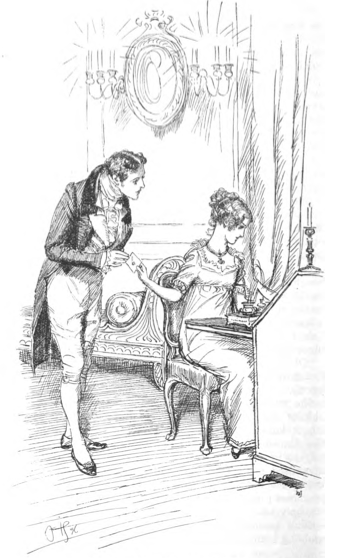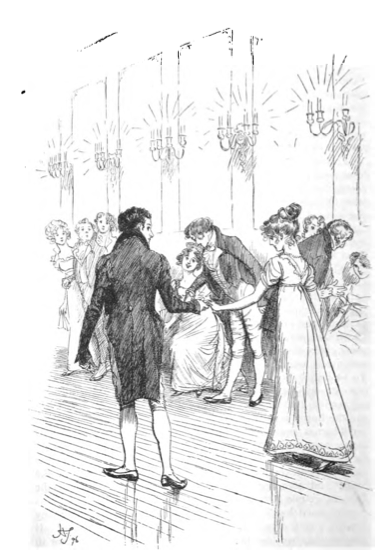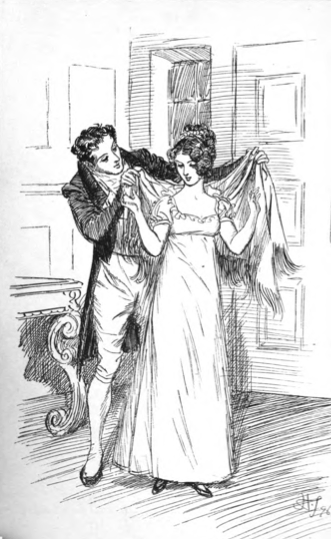“I am quite determined to marry Fanny Price. … I am fairly caught. You know with what idle designs I began; but this is the end of them. I have, I flatter myself, made no inconsiderable progress in her affections; but my own are entirely fixed.” (Mansfield Park, by Jane Austen, Ch. XXX)
Many people think that it is unnatural for Henry Crawford to fall in love with Fanny Price. I find Fanny to be a very lovable girl, so it is not a stretch for me to think of a charming man falling in love with her. Furthermore, I think that it was natural under the circumstances for Henry to fall in love with her, and I shall attempt to explain why.
Fanny is not as immediately attractive as others of Jane Austen’s heroines, but, when you get to know her, she has a quiet charm of her own. Henry only intended to flirt with 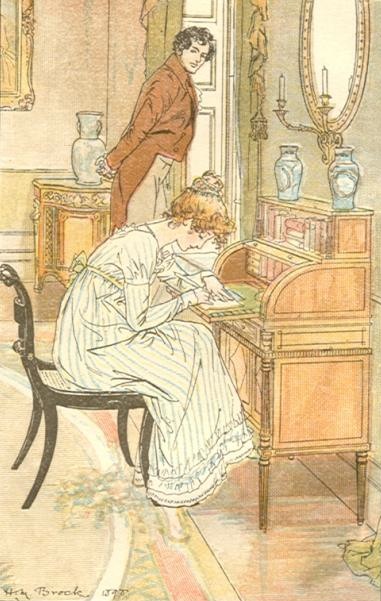 Fanny, not to fall in love with her. His attraction was simply boredom (the Bertram sisters weren’t around anymore for him to flirt with) and the desire to conquer. He tells his sister, “Her looks say, ‘I will not like you, I am determined not to like you’; and I say she shall.” (Ch. XXIV). In the process of wooing her, however, he gets to know her better and falls in love with her. He discovers her sweetness, her intelligence, her high sense of honor — and no one has denied that she is a pretty girl. He feels that he can depend on her “faith and integrity”. “Her temper he had good reason to depend on and to praise. He had often seen it tried. … Her affections were evidently strong. To see her with her brother! What could more delightfully prove that the warmth of her heart was equal to its gentleness? What could be more encouraging to a man who had her love in view?” (Ch. XXX).
Fanny, not to fall in love with her. His attraction was simply boredom (the Bertram sisters weren’t around anymore for him to flirt with) and the desire to conquer. He tells his sister, “Her looks say, ‘I will not like you, I am determined not to like you’; and I say she shall.” (Ch. XXIV). In the process of wooing her, however, he gets to know her better and falls in love with her. He discovers her sweetness, her intelligence, her high sense of honor — and no one has denied that she is a pretty girl. He feels that he can depend on her “faith and integrity”. “Her temper he had good reason to depend on and to praise. He had often seen it tried. … Her affections were evidently strong. To see her with her brother! What could more delightfully prove that the warmth of her heart was equal to its gentleness? What could be more encouraging to a man who had her love in view?” (Ch. XXX).
Fanny’s attractions increased—increased twofold; for the sensibility which beautified her complexion and illumined her countenance was an attraction in itself. He was no longer in doubt of the capabilities of her heart. She had feeling, genuine feeling. It would be something to be loved by such a girl, to excite the first ardours of her young unsophisticated mind! She interested him more than he had foreseen. A fortnight was not enough. His stay became indefinite. (Ch. XXIV)
Unlike the other girls Henry has known, who were all ready to flirt with him, he must earn Fanny’s respect and regard. Henry expressed his feelings toward marriage earlier in the novel, “I am of a cautious temper, and unwilling to risk my happiness in a hurry.” He is willing to flirt with any attractive girl, but unwilling to commit his happiness to her. Fanny is different. “I could so wholly and absolutely confide in her,” said he; “and that is what I want.” (Ch. XXX). Fanny’s resistance presents him with a challenge, which stimulates him, making “her affection appear of greater consequence because it was withheld, and determined him to have the glory, as well as the felicity, of forcing her to love him” (Ch. XXXIII).
Love such as his, in a man like himself, must with perseverance secure a return, and at no great distance; and he had so much delight in the idea of obliging her to love him in a very short time, that her not loving him now was scarcely regretted. A little difficulty to be overcome was no evil to Henry Crawford. He rather derived spirits from it. He had been apt to gain hearts too easily. His situation was new and animating. (Ch. XXXIII)
I think also that Henry liked the idea of marrying a “damsel in distress”, so to speak, — of “rescuing” her and raising her up. He tells his sister, “[Maria and Julia Bertram] will now 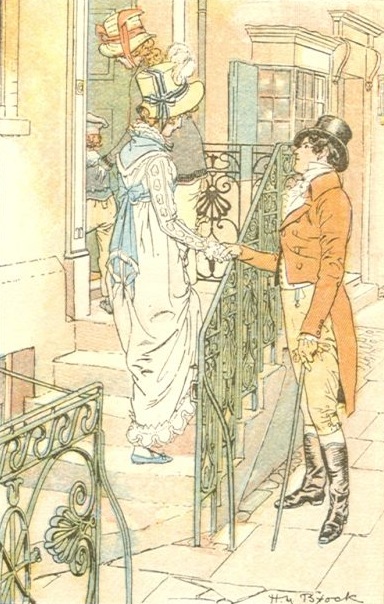 see their cousin treated as she ought to be, and I wish they may be heartily ashamed of their own abominable neglect and unkindness. … Yes, Mary, my Fanny will feel a difference indeed: a daily, hourly difference, in the behaviour of every being who approaches her; and it will be the completion of my happiness to know that I am the doer of it, that I am the person to give the consequence so justly her due. Now she is dependent, helpless, friendless, neglected, forgotten. … What can Sir Thomas and Edmund together do, what do they do for her happiness, comfort, honour, and dignity in the world, to what I shall do?” (Ch. XXX, bold emphasis mine)
see their cousin treated as she ought to be, and I wish they may be heartily ashamed of their own abominable neglect and unkindness. … Yes, Mary, my Fanny will feel a difference indeed: a daily, hourly difference, in the behaviour of every being who approaches her; and it will be the completion of my happiness to know that I am the doer of it, that I am the person to give the consequence so justly her due. Now she is dependent, helpless, friendless, neglected, forgotten. … What can Sir Thomas and Edmund together do, what do they do for her happiness, comfort, honour, and dignity in the world, to what I shall do?” (Ch. XXX, bold emphasis mine)
I think that Fanny is not the kind of woman that Henry would have imagined marrying, or even as likely to attract him, but, once he got to know her better, he could see her charm and goodness. Probably if the Bertram sisters had not left, he would never have noticed Fanny. His initial attraction to Fanny can be expressed in his words, “Why did she draw back and look so grave at me? I could hardly get her to speak. I never was so long in company with a girl in my life, trying to entertain her, and succeed so ill! Never met with a girl who looked so grave on me! I must try to get the better of this.” (Ch. XXIV). He was used to gaining hearts too easily. Her attraction was simply that she did not care for him. So, Henry set about a flirtation with her, and then fell in love.
In his book A Fine Brush on Ivory, Richard Jenkyns puts it like this:
[I]tis perhaps worth noting that both the men in Fanny’s life, Henry and Edmund, take quite a while to see [Fanny] as an object of desire. … Fanny Price takes some getting to know. For what it is worth, my own experience has been that the longer one lives with Mansfield Park, the more lovable she becomes. …
Some critics have found it hard to believe that a lively, worldly man like Henry Crawford could ever have fallen for a good little mouse like Fanny, but on the contrary, he is exactly the type of man who marries his secretary. It is significant that he is said to be plain: he needs to prove to himself his power of conquest. Henry is vain: he wants power and he wants admiration. He knows that Fanny is pretty and gentle, but he also comes to realize that she is passionate: he has seen this from the warmth and strength of her love for her brother. … But he also wants adoration. His sister sees it at once: ‘I approve your choice from my soul, and foresee your happiness as heartily as I wish and desire it. You will have a sweet little wife; all gratitude and devotion.’ … [G]enuine love and affection may be inextricably bound up with a gentle vanity and the gratification of self-esteem. … And the irony in Henry Crawford’s case is that he has misread: Fanny, who is a great deal meeker than Catherine [Morland of Northanger Abbey], is not so simple and artless: she is a tough, severe judge.1
If Henry had met Fanny in London, I doubt he would ever have noticed her. Even in Mansfield, he overlooks her until Maria and Julia are gone, and she is the only young woman left for him to notice. (As his sister said, “The truth is, that she was the only girl in company for you to notice, and you must have a somebody.” — Ch. XXIV) But, under the circumstances, he does notice her. He finds her to be pretty, gentle, passionate, trustworthy, and sweet. The idea of gaining her affections and “rescuing” her, so to speak, attracts him. So, was it natural for Henry to truly fall in love with Fanny? I think so.
_______________________________
1 A Fine Brush on Ivory, by Richard Jenkyns (New York: Oxford University Press, 2004, pp. 109, 135-136).
Illustrations: “Returning to her seat to finish a note” (Chap XXX) and “He….left them only at the door” (Chap XLI), by H.M. Brock.
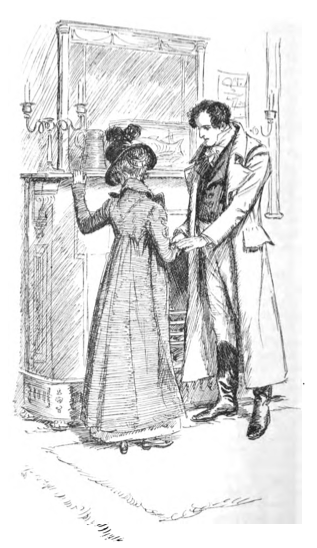 Mansfield Park is a tragedy. Its readers often exclaim, “If only!”
Mansfield Park is a tragedy. Its readers often exclaim, “If only!”